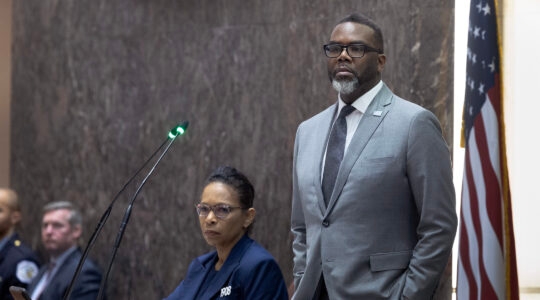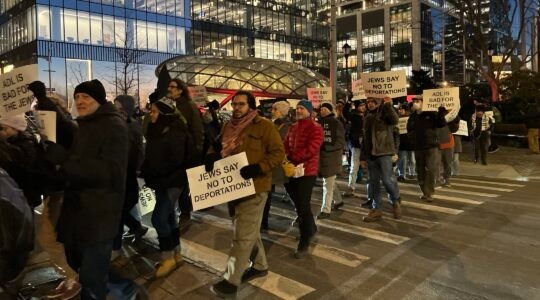STOUGHTON, Mass. (JTA) — In his home continent, Dutch politician Geert Wilders is something of a pariah, banned from the United Kingdom and facing prosecution in the Netherlands for his harsh views of Islam.
His calls to end immigration from Muslim countries and ban the Koran — he compared it to Hitler’s “Mein Kampf” and said it incites to violence — have earned him broad condemnation in Europe and forced him under the protection of a security detail, a rarity for Dutch leaders.
But in some quarters of the American Jewish community, Wilders is more akin to a hero. At the very least, he was greeted as such by about 250 people last week at a Conservative synagogue in this Boston-area town.
The boisterous crowd at the Ahavath Torah Congregation gave Wilders, who heads the Dutch Party for Freedom and serves in the parliament, a standing ovation and shouted “Bravo” at the conclusion of his speech.
In an event co-sponsored by the Middle East Forum’s Legal Project and the Republican Jewish Coalition, Wilders made his only synagogue appearance on his recent tour of the United States, where he appeared on cable news networks and radio talk shows, spoke at the National Press Club and held a private showing of his anti-radical Islam film “Fitna” for senators and their staff on Capitol Hill.
The Middle East Forum’s director, Daniel Pipes, said he doesn’t agree with Wilders that the Koran should be banned. But he does believe that Wilders should be able to publicly present that view, which is why his organization co-sponsored the talk and is raising funds for Wilders’ legal defense.
“I don’t need to agree with him to see the importance of him making his arguments,” Pipes said.
Wilders is among a small number of European political figures who have spoken out forcefully about the impact of Muslim immigration and what they see as a religion irrevocably at odds with Western values. In the Netherlands, renowned for its liberalism and tolerance, the debate has often been particularly fraught.
A former parliamentary colleague of Wilder’s, Ayaan Hirsi Ali, was forced into hiding for her work on a film critical of Islam’s treatment of women. Theo Van Gogh, a Dutch filmmaker and Hirsi Ali’s partner, was murdered on an Amsterdam street in 2004. Pim Fortuyn, another Dutch politician outspoken about immigration and Islam, was murdered in 2002.
In Europe, where freedom of speech laws are generally more restrictive — Holocaust denial, for example, is widely outlawed — figures like Wilders have pushed the boundaries of acceptable discourse. But in the United States, with its comparatively looser speech laws, the violence and intimidation directed at Islam’s harshest European critics is seen by some as allowing radical viewpoints to flourish.
“If our collective voice is impeded from speaking” or “shut down,” said Pipes, then “the way is paved for radical Islam to move ahead.”
Pipes says hate speech laws, which also have been used to prosecute Holocaust deniers in Europe, are a bad idea.
“I believe in the First Amendment,” he said.
Republican Jewish Coalition executive director Matt Brooks takes a similar position, saying that while he also opposes banning the Koran, he believes Wilders’ views should still be given a hearing.
“If we only had speakers we agree with 100 percent of the time, it would be a very small universe of speakers,” Brooks said.
Bjorn Larsen, whose International Free Press Society arranged Wilders’ U.S. tour, said the Dutch politician was invited personally by the rabbi at Ahavath Torah, Jonathan Hausman.
Hausman would not speak on the record to JTA about the event.
Security was tight in Stoughton, with bags being checked and guards for Wilders. After a showing of “Fitna,” Wilders said the Koran is being used as a justification for “hatred, terrorism and violence against the world,” and he outlined how he believes the rise of Islam in Europe is threatening the traditional Judeo-Christian values of the West.
A staunch supporter of Israel who once lived on a moshav, Wilders also proclaimed solidarity with the Jewish state.
Israel “is receiving the blows for all freedom-loving people,” he said. “We are all Israel. We have to defend our freedom.”
Wilders noted that while he was banned from the United Kingdom despite being a member of the Dutch parliament and carrying an E.U. passport., the head of Hezbollah was allowed to enter the country.
“This is Europe today,” he said.
There were no protests at Wilders’ speech — there was little advance publicity — and many in the crowd were sympathetic to his arguments. Andrew Warren of Sharon said he wanted to judge for himself whether Wilders is xenophobic, and said afterwards that Wilders had not crossed the line.
“The unfortunate reality is that a lot of troubling passages in the Koran are being embraced by militant ideology,” Warren said.
Louise Cohen of Brookline described Wilders as a hero and a man of courage.
“What’s disturbing to me is that no one has said that there is anything in his movie that is false,” she said.
While unaware of Wilders’ call to ban the Koran, Cohen said his film makes a case that the Koran is a hate document.
That view troubles Ron Newman, who said Wilders took certain verses from the Koran that appeared to promote violence and used them to generalize about all of Islam.
Saying that a similar approach could be used with portions of the Torah, Newman cautioned that the line of reasoning could be used to produce an anti-Semitic film.
“I don’t like that being done to us," he said. "I don’t support people who do that to others.”
Nonetheless, as a staunch supporter of free speech, Newman said the attempt to squelch Wilders’ film and the refusal to allow him into Great Britain is a travesty.
(Staff writer Eric Fingerhut in Washington contributed to this report.)
JTA has documented Jewish history in real-time for over a century. Keep our journalism strong by joining us in supporting independent, award-winning reporting.





